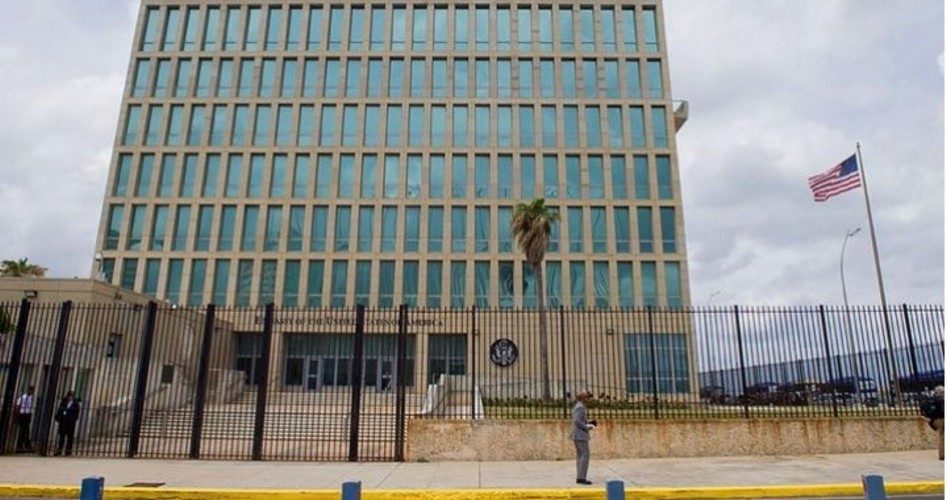
The State Department released a press statement on October 3 that said the department informed the government of Cuba that it was ordering the departure of 15 officials from the Cuban embassy in Washington, D.C.
This was the latest step in our government’s response to the unexplained, mysterious symptoms exhibited by U.S. diplomats in Havana, which U.S. officials believe were caused by “sonic attacks.”
The statement explained that the decision was made “due to Cuba’s failure to take appropriate steps to protect our diplomats in accordance with its obligations under the Vienna Convention.”
On September 29, as a precaution until the source of the sonic attacks would be determined, the department ordered the departure of non-emergency personnel assigned to the U.S. Embassy in Havana, as well as all family members. This amounted to more than half of the American staff at the embassy.
The State Department statement continued: “Until the Government of Cuba can ensure the safety of our diplomats in Cuba, our embassy will be reduced to emergency personnel to minimize the number of diplomats at risk of exposure to harm. We continue to maintain diplomatic relations with Cuba, and will continue to cooperate with Cuba as we pursue the investigation into these attacks.”
The reduction of the Cuban embassy staff in Washington was aimed at bringing the staffs at both embassies into approximate balance.
An AP article carried by the Denver Post on October 2 noted that U.S. intelligence operatives operating in Cuba were among the first and most severely affected victims of the sonic attacks. The article stated:
It wasn’t until U.S. spies, posted to the embassy under diplomatic cover, reported hearing bizarre sounds and experiencing even stranger physical effects that the United States realized something was wrong, individuals familiar with the situation said.
While the attacks started within days of President Donald Trump’s surprise election in November, the precise timeline remains unclear, including whether intelligence officers were the first victims hit or merely the first victims to report it. The U.S. has called the situation “ongoing.”
Starting in the fall of 2016, when several employees at the U.S. embassy in Havana began complaining of physical symptoms, U.S. government officials concluded that their maladies could be attributed to a device that operates outside the audible hearing range — emitting what has been described as “sonic attacks.”
“Some U.S. government personnel who were working at our embassy in Havana, Cuba, on official duties — so they were there working on behalf of the U.S. embassy there — they’ve reported some incidents which have caused a variety of physical symptoms,” Heather Nauert, a spokeswoman for the State Department, said in a news briefing back on August 9.
CNN reported in August that the attacks, which began in November and ended this spring, left some embassy personnel with mild traumatic brain injury; two might have permanent hearing loss. The U.S. government believes that the sonic devices were deployed either inside or outside diplomats’ residences in Havana, injuring at least 16 Americans, several senior State Department officials told CNN. Since then, the number of confirmed cases has risen to 21.
On September 29, the State Department issued a statement warning Americans not to travel to Cuba. The warning explained:
Over the past several months, numerous U.S. Embassy Havana employees have been targeted in specific attacks. These employees have suffered significant injuries as a consequence of these attacks. Affected individuals have exhibited a range of physical symptoms including ear complaints and hearing loss, dizziness, headache, fatigue, cognitive issues, and difficulty sleeping.
The statement did not assign blame to any specific entity for what our government believes are sonic attacks. It described actions taken by our State Department, such as the ordered departure of non-emergency U.S. government employees and their family members from Havana, as protective measures.
The warning against travel to Cuba is necessitated, says the statement, because the skeleton staff remaining at the embassy is inadequate to assist U.S. citizens. The warning also advised Americans not to attempt to go to the U.S. Embassy, as it suffered severe flood damage during Hurricane Irma.
The only blame the statement placed on Cuba was by noting that “the Government of Cuba is responsible for taking all appropriate steps to prevent attacks on our diplomatic personnel and U.S. citizens in Cuba,” implying that Cuba has failed to fulfill this responsibility.
So far, our government has not said that it has found evidence that Cuba is responsible for the sonic attacks on U.S. personnel. Secretary of State Rex Tillerson’s October 3 statement concluded:
We continue to maintain diplomatic relations with Cuba, and will continue to cooperate with Cuba as we pursue the investigation into these attacks.
Photo of U.S. Embassy in Havanah: United States Department of State
Related articles:
Trump’s Crackdown on Cuban Regime Draws Praise and Fury
Trump Vows that, “With God’s Help,” Cuba Will Soon Be Free
Trump Vows that, “With God’s Help,” Cuba Will Soon Be Free
President Trump Justified in Reversing Obama’s Cuba Policy
Obama Pushes Communist Vision of “Rights” on Cuba Trip
Obama’s Political Career Began With Castro-backed Terrorist
Globalists, UN, and Big Business Legitimizing Cuban Regime
Obama Visit Doesn’t Deter Cuban Government from Suppressing Dissidents
White House Eases Travel, Commerce Restrictions Imposed on Cuba
Amid Obama Visit, Che Guevara’s Son Vows Communist “Tsunami”
D.C. Leaders Look to Communist Cuba for “Education Successes”
Obama Set to Remove Castro Terror Regime from U.S. Terror List
Exposure of Radical CFR Latin America Boss Offers Broad Insight
Birch Society’s Robert Welch Was Correct on Castro
Ex-Bodyguard Exposes Fidel Castro’s Drug Dealing, Corruption, Murders



